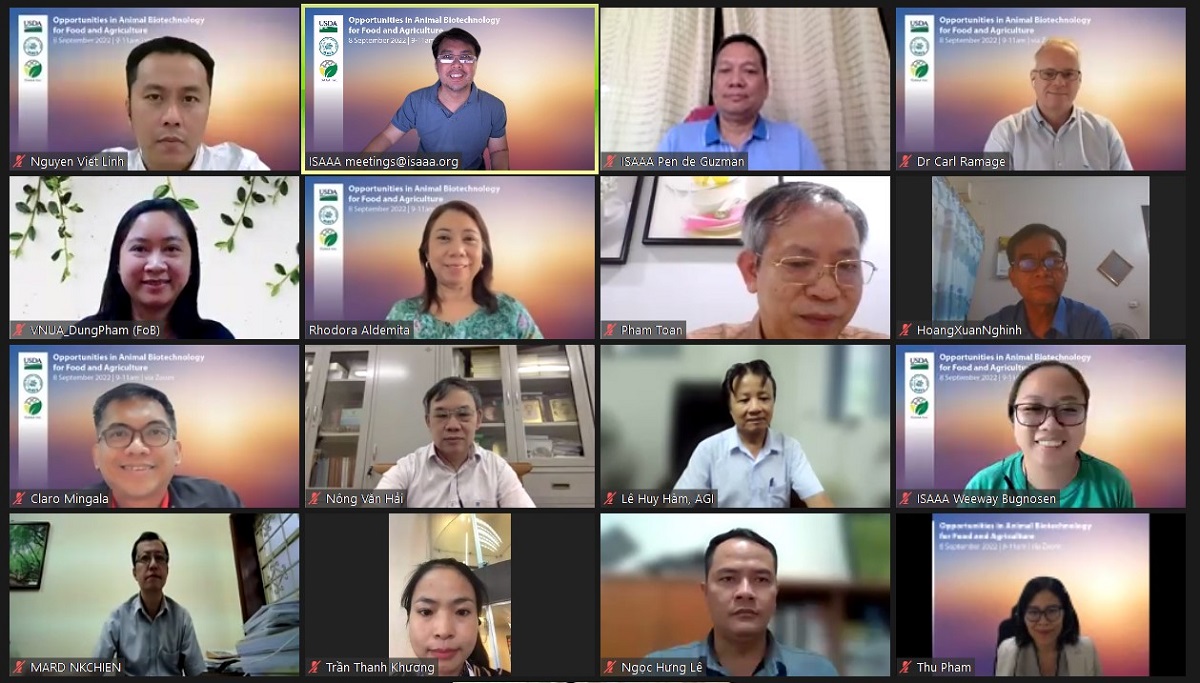
Vietnam’s Animal Biotech Research Capability to Support Gov’t’s Agricultural and Environmental Sustainability Goals
September 14, 2022| |
ISAAA Inc., the United States Department of Agriculture Foreign Agricultural Service Hanoi (USDA FAS Hanoi), and the Vietnam Agricultural Genetics Institute organized the webinar Opportunities in Animal Biotechnology for Food and Agriculture on September 8, 2022, via Zoom. The webinar is the third in a series of four that aimed to explore the opportunities in animal biotechnology for further development of the food and agriculture industries of Vietnam.
Dr. Rhodora Romero-Aldemita, Executive Director of ISAAA Inc. served as facilitator of the event, while Dr. Pham Van Toan, Vice President of Vietnam Academy of Agricultural Sciences, served as the moderator. During her welcome remarks, US Embassy Hanoi's Agricultural Attaché Ms. Sarah Gilleski expressed USDA's support for new breeding tools like genome editing to address the challenges of climate change and food security especially in Vietnam. She also mentioned the importance of the modernization of regulations to maximize the benefits of the technology and provide more opportunities and options for farmers, scientists and consumers alike.
Dr. Tong Xuan Chinh, Deputy Director General of the Department of Livestock Production under the Ministry of Agriculture and Rural Development, also gave his opening message, which focused on the importance of animal biotechnology in Vietnam's food and agriculture sectors. He stated Vietnam strives for food sustainability and environmental protection with agriculture as their foundation. The application and utilization of new scientific technology can help improve the quantity and quality of animal husbandry products and reduce the need for the animals' antibiotic intake. Alongside these new technologies, policies and regulations also play a role on their proper implementation to ensure that Vietnam will be able to face the challenges brought by climate change and achieve the targeted methane reduction goals by 2030.
Dr. Carl Ramage of Rautaki Solutions Ltd. in Australia talked about the global overview of animal biotechnology applications for food and agriculture, regulations, and potentials. His presentation dwelled on genetically engineered and gene-edited targets that have been identified and characterized by animals, along with the numerous biomedical models that have been generated using gene editing techniques. He stated that there are significant opportunities for improved animal health and welfare on the market especially in livestock, and that commercialization of the products will depend on a clear pathway to market and an effective value capture model. Most importantly, he said that it is important to strike a balance between risk management and innovation.
Dr. Claro Mingala, Director the Biotech Program Office of the Department of Agriculture in the Philippines and former Center Chief of the Livestock Biotech Center at the Philippine Carabao Center, talked about the animal biotechnology policy considerations in the Philippines. He gave a brief explanation on the evolution of the Philippine biotechnology regulatory system. Currently, the Philippines' regulatory policy on genetically modified animals is in the last stage of finalization and is expected to be signed by the heads of five government offices by the end of 2022 to take effect. He also emphasized that gene-edited products that do not contain novel combinations of genetic materials are not covered by the policy.
Dr. Nguyen Vien Linh of the Institute of Biotechnology of the Vietnam Academy of Science and Technology gave a mini review of the animal reproductive biotechnology in Vietnam and enumerated the milestones in animal reproductive biotechnology in the country. He presented two case studies, the development of ARTs for Vietnamese native pigs, and the development of ARTs and iSCNT for Gaur and Saola, which are bovines native to Vietnam. He noted that the establishment of ARTs and SCNT systems are necessary for the conservation of both domestic and wild animals. Animal reproductive biotechnology, including cryo-banking, could serve as a productive tool for ex-situ biodiversity conservation system in Vietnam in consideration of receiving support from an international network of in-situ and ex-situ biodiversity conservation system.
An open forum was held after the presentations. The webinar concluded with the closing remarks by Dr. Romero-Aldemita and an invitation to the last webinar of the series which will be held via Zoom in October 2022.
For more information, contact zbugnosen@isaaa.org.
| |
You might also like:
- Experts Highlight Impacts of Agri-biotech Adoption in Vietnam
- Farmer Survey Reveals Significant Economic, Environmental Benefits From GM Corn in Vietnam
- Biotech Crops Continue to Become Beneficial and Popular in Vietnam
Biotech Updates is a weekly newsletter of ISAAA, a not-for-profit organization. It is distributed for free to over 22,000 subscribers worldwide to inform them about the key developments in biosciences, especially in biotechnology. Your support will help us in our mission to feed the world with knowledge. You can help by donating as little as $10.
-
See more articles:
-
News from Around the World
- What do you think of this newsletter?
- Nigeria Adopts Guidelines on GM Plants with Stacked Genes
- Researchers Unearth Genome of Wild Shrub from Tomato Family
- US Launches National Biotechnology and Biomanufacturing Initiative
- Canada's Guidelines on Gene Editing to Advance Innovation
- GM Purple Tomato Gets Approval in the United States
- Vietnam’s Animal Biotech Research Capability to Support Gov’t’s Agricultural and Environmental Sustainability Goals
- Asian Regional Workshop on Current and Upcoming Items under the CBD and its Protocols
-
Research Highlights
- Study Reveals Role of CW198 in Enhancer-promoter Interaction in Plants
-
Plant
- BREEDIT Bridges Gap Between Conventional Breeding and Gene Editing Techniques
- Specialty Crops to Hit the Market as First Gene-edited Entrants
- CRISPR Used to Develop Low Glutelin Rice for Phenylketonuria and Kidney Disease Patients
-
Read the latest: - Biotech Updates (December 17, 2025)
- Gene Editing Supplement (December 17, 2025)
- Gene Drive Supplement (February 22, 2023)
-
Subscribe to BU: - Share
- Tweet

